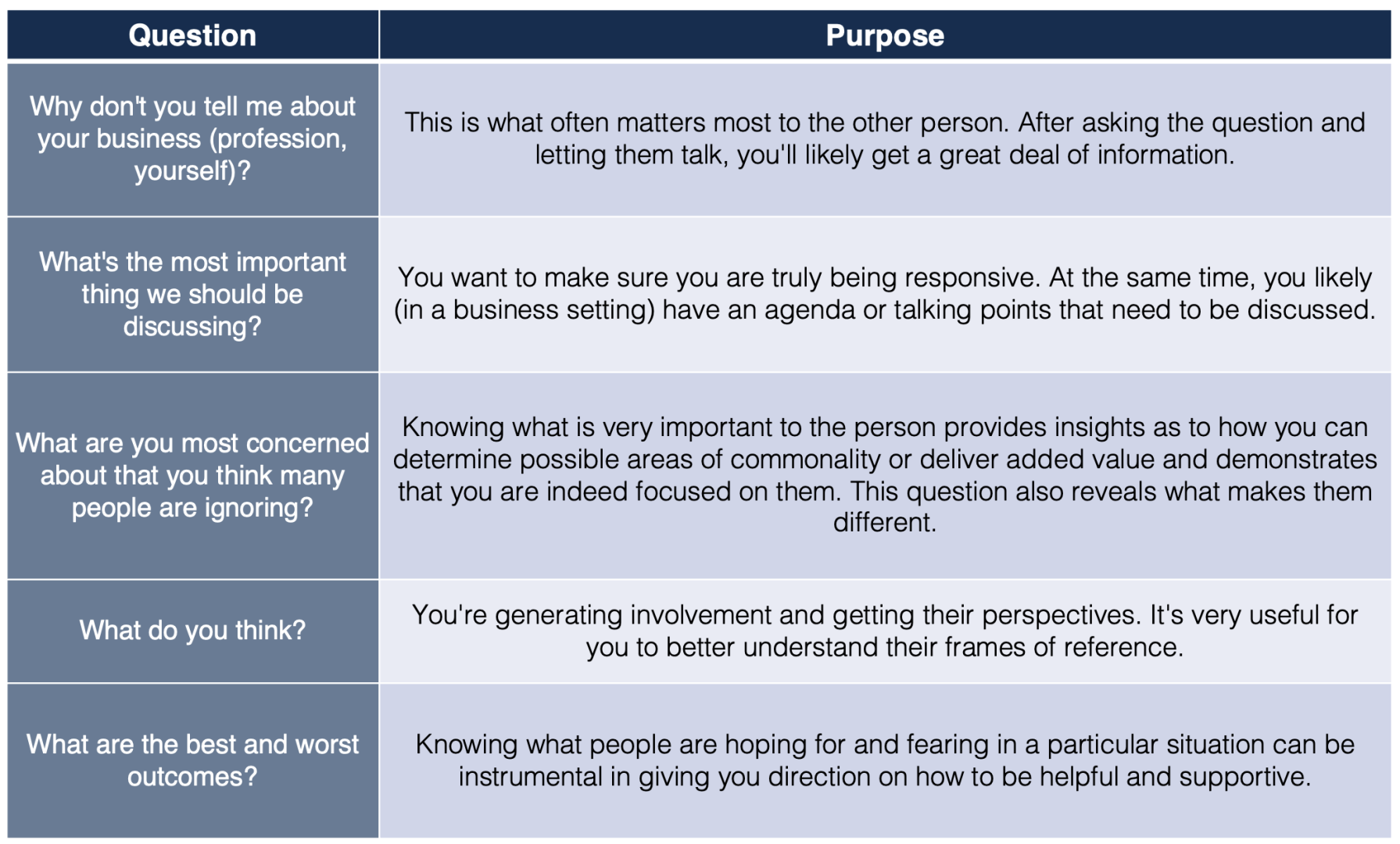
Questions Build Rapport
Meaningful relationships with others are an important ingredient of success and happiness in life. Knowing how to ask the right questions can help build meaningful relationships. It’s rare when great achievements come about solely because of independent intelligence or efforts. Relationships are the foundation of what James Hughes has called “social capital”—one of the five forms of wealth that an individual or family possesses. Social capital consists of a family’s relationships between family members and the broader community.
However, not all relationships are built on the same foundation. An unethical approach, marked by manipulation or transactional intent, can damage trust and reputation. In contrast, ethical relationships—especially in advisory roles—are based on mutual respect, truthfulness, and cooperation. For a wealth advisor or family office team, this ethical grounding is essential for building trust across generations. One skill to develop this is learning how to ask the right questions.
In both personal and professional settings, building strong rapport is as crucial as having technical knowledge. In the family office context, the ability to ask thoughtful, open-ended questions is a cornerstone of relational intelligence. These skills help estate planning attorneys and wealth advisors understand not just financial goals, but the values, concerns, and aspirations of the families they serve.
At a Glance
■ Open-ended questions help you gain key information from people.
■ Probing helps you dive deep into specific topics of interest to you.
■ Tempering your questions can help you learn sensitive information.
How to Use Open-Ended Questions
An attitude of genuine curiosity is essential for estate planning attorneys, wealth advisors, and family office professionals. Practicing the art of open-ended inquiry not only uncovers insights but also demonstrates competence and emotional intelligence—key traits for anyone advising families on complex, often deeply personal matters.
The way a question is framed can make a big difference in the answers received and the level of connection you make. Open-ended questions are those that cannot be answered with a simple yes or no or a very brief response. The best open-ended question is still specific and engaging enough to reveal a consideration of topic and an interest in the answer.
Open-ended questions are designed to get expansive, meaningful answers from people by requiring them to think and elaborate. Generally, people who are thoughtful and have expertise are grateful for an opportunity to explain themselves or their work. Thus, these questions are good at building trust and rapport, as well as at generating lots of information.
Below are some question prompts that may be useful.

Tempering Open-Ended Questions
Sometimes other people react negatively to certain questions. If you are apprehensive of blowback from a particular question, it is wise to temper it with an introduction.
There are different ways to do this. One effective approach is to use disclaimers, which can take the “sting” out of open-ended questions and allow the other person a comfortable way of declining to answer. Examples of disclaimers include:
• I’m not sure how to ask this, but …
• Without imposing, can I ask you about …
• I don’t want to make you uncomfortable, but …
• If I’m being too forward, let me know, but …
• This might be touchy, but can I ask you about …
Example: If a financial advisor wants to ask a potential client about his or her income you might ask, “I’m not sure how to ask this, but are you earning enough to support your lifestyle?” If the question is offensive, the person will often say something along the lines of “Let’s not talk about that.” If so, you move on to something else quickly. On the other hand, you might get the information you seek.
Example: an estate planning attorney might ask, “Without imposing, can I ask how you envision your children participating in future family decisions?” This approach invites honest dialogue while preserving the client’s comfort.
It is important to keep the conversation moving forward. If people are reticent about some matters, tempering open-ended questions usually allows the conversation to continue without one side shutting down or ending the discussion. Additionally, try not to ask too many sensitive questions in a row, even if they are tempered.
Turning Declaration Statements into Questions
Generally, those who are confident about themselves, and their points of view are inclined to tell others what they think. However, they are less inclined to find out what others believe. It is quite common for confident, hard-driving, successful people to make extensive use of declarative statements.
However, declarative statements often do little to build rapport. You may think that projecting confidence will attract clients or business associates, while in fact open-ended questions can be the most effective way not only to gather critical intelligence but also to nurture a relationship.
There are various ways to transform declarative statements into open-ended questions. Below are three easy but effective formulas.
1. Turn the Declarative Statement into a Question
Declarative statement: The team is struggling with this project.
Question: How is this a difficult project?
2. Welcome the Involvement of the Other Person
Declarative statement: I don’t see how your idea would work.
Question: Please explain how your idea would work, considering the complications?
3. Add an Invitation to Provide Advice
Declarative statement: I’m going to change the company structure.
Question: The company structure needs a change. How would you suggest I do so?
By increasing the level of involvement and engagement of others in the conversation, you’re likely to greatly enhance your connection with them. As a result, the people you’re talking to will share more openly, potentially revealing a solution or point of view not yet considered.
Be a Good Listener
Open-ended questions allow you to start collecting a broad range of information. As that unfolds, you need to show that your listening, especially if you hear comments that you want to know more about-maybe much more.
Probes are verbal and nonverbal forms of encouragement that signal to the person that you are interested in what they said, and that you’d like them to share more. Probes are used to fill in missing information that might enhance the relationship. Nonverbal encouragements include simple actions like leaning in a little more toward the speaker and nodding your head in agreement. Verbal encouragements include comments such as “uh-huh,” “yes” and “go on” that indicate to the other person that you’d like them to keep talking.
Listening Tips
Consider this list of twelve listening tips that will allow you to follow up on your question and receive more information.
- Active Listening: Engage with the speaker actively. It’s more than just hearing words; it’s about genuinely understanding content and intent.
- Concentration: Focus intently on what the speaker is saying without allowing your mind to wander.
- Avoid Interruptions: Allow the speaker to finish their thoughts without interruption. This shows respect and ensures that you get the full message.
- Withhold Immediate Judgment: Do not jump to conclusions or make hasty judgments. Give the speaker the benefit of the doubt and take time to process the message.
- Listen Between the Lines: Pay attention to what is implied or unsaid. This helps in understanding the speaker’s perspective and emotions.
- Stay Open-minded: Even if you disagree with the speaker, approach the conversation with an open mind. This ensures you capture their full perspective.
- Resist Distractions: Eliminate or avoid external distractions that can divert your attention away from the speaker.
- Follow: If something is unclear, do not hesitate to ask for clarification. It demonstrates interest and helps ensure understanding. Or ask, “Can you please tell me more.”
- Practice Empathy: Try to understand and feel the emotions of the speaker. This deepens the connection and enhances comprehension.
- Take Notes: Especially during long or complex discussions, jotting down key points can help you retain and process information.
- Reflect and Summarize: After listening, mentally summarize the key points. If appropriate, you can also repeat these points back to the speaker to confirm understanding.
- Practice Regularly: Like any skill, listening improves with consistent practice. Seek out opportunities to engage in conversations and practice your listening skills.
Good Leadership Asks Questions
A recent article in the Harvard Business Review examines how leaders must prioritize the art of inquiry over merely providing answers. Many executives operate under the belief that their role is to offer bold solutions, thinking it demonstrates their competence.
However, such a mindset can erode trust, especially in a time when change and uncertainty are prevalent. Portraying oneself as having all the answers may indicate ignorance about the fast-changing world or worse, dishonesty. Instead, leaders should embrace asking meaningful questions, signaling their willingness to show vulnerability and collaborate on solutions. This approach not only builds trust but encourages innovation and problem-solving.
Effective questioning goes beyond putting individuals on the spot. Leaders should aim for questions that inspire collective exploration of untapped opportunities. Queries like “What emerging needs can pave the way for a new business?” or “How can we harness technology to enhance customer trust?” communicate ambition and forward-thinking. However, the power of these questions lies not just in asking them, but in posing them to the right people. By sharing them organization-wide or even externally, leaders foster collaboration and tap into diverse expertise.
Summary
Estate planning attorneys, wealth advisors, and family office professionals who employ well-crafted questions will foster a repution for their clients. Open-ended questions can help forge rapport in personal and business relationships. Be sure to listen carefully and then probe for additional details in order to make the most of your discussions.
